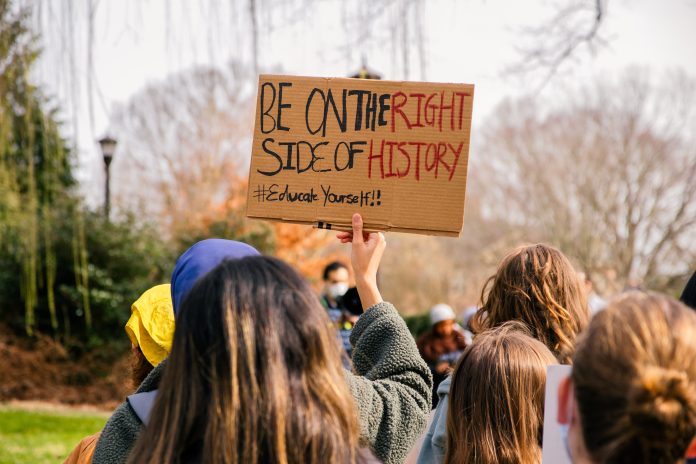Editor’s Note: The Flat Hat has decided to honor the requests of several sources and keep their identities anonymous out of protection for their safety and wellbeing.
Friday, March 1, the College of William and Mary’s chapter of Students for Justice in Palestine held its second “Walkout for Palestine” of the semester. Approximately fifty students convened on the Sadler Center Terrace for two opening speeches followed by a march around campus with three designated spots for professor and student speakers.
An SJP-affiliated leader commenced the walkout with a reflection on the recent violence in Gaza.
“When I first used my voice here, I spoke of war crimes in Gaza that were without precedent,” the SJP-affiliated leader said. “Yet, since then, what was once unimaginable has now become a harrowing reality.”
Another SJP leader remarked in their speech that the College is complicit in the conflict through its continued economic practices.
“Our school is involved in a global genocide, and I don’t say this without evidence,” the SJP-affiliated speaker said. “I do not say this without backing. We have financial complicitness in what’s happening, but that also means we have the potential to end that financial complicitness to contribute to a global movement for change.”
After sharing updates on the conflict and reiterating the SJP’s goal for Palestinian liberation, SJP members rehearsed chants with the crowd before beginning their march out of the Sadler Center.
“We want justice, you say ‘how?’ End the siege on Gaza now!” one of the various chants went.
Along the march route, Associate Professor of Anthropology and Director of Asian and Middle Eastern Studies Andrea Wright delivered a speech in support of the walkout. In her reasoning for her participation, she underscored the importance of solidarity for continued activism.
“I came today largely because I think it’s important for us all to come together, when we see injustices, to speak out,” Wright said.
Wright commented on the scale of the conflict.
“It seems to me as though, like the current crisis in Gaza, regardless of political orientated positions, or what we think about the past or the future, what’s happening right now is horrifying. So many children died and so many civilians have been killed. And then the specter of famine — that people are beginning to die of famine,” Wright said.
Other participants expressed a similar reason for attending the walkout. One participant felt there was a lack of solidarity between the SJP’s mission and the greater College community’s attitudes. The group, which the Community Values and Restorative Practice office put on probation in December 2023, hosted this event after an earlier demonstration Thursday, Feb. 8.
“Why I decided to come to this afternoon is that I feel like this school, the administration — there’s a culture around just not caring and being complicit to what is going on in Palestine as well as militarism and stuff like that,” one participant said. “And I want to help change that narrative and make people aware of what’s going on. They can’t ignore it.”
Associate Professor of Anthropology William Fisher echoed this sentiment, noting the general reluctance to discuss the Middle Eastern conflict in the classroom.
“The sort-of sine qua non of relevant education is to be able to bring the issues of the day into the classroom,” Fisher said. “And the fact that so many faculty are apparently afraid to talk about what’s going on, even in a broader sense, shows the degree of intimidation from whatever quarter that people are feeling. I would like more people to talk about what’s going on and to make that part of what we do.”
Fisher also cited his previous experience at the College and expressed his desire for increased awareness of the conflict.
“I would like more people to talk about what’s going on and to make that work [part] of what we do. And I’ll say one thing, I was here during the economic crisis of 2008, and it was as if nothing was happening outside the university. And I was maybe so aware of how we could build the bubble that I tried to avoid in all my classes,” Fisher said.

